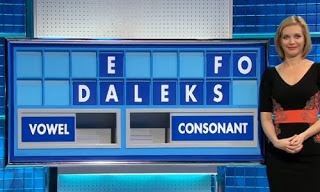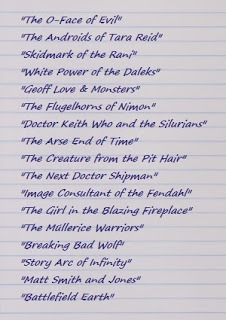Lawrence Miles's Blog
October 6, 2015
PEDANTFIGHT!!!
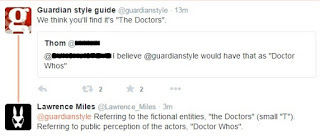
Examples:
"The Tenth, Fifth, and Second are the best of the Doctors."
"Christopher Eccleston, Peter Davison, and Patrick Troughton were the best Doctor Whos."
Listen, kid, I was writing Doctor Who literature before you were at the Guardian Style Guide.
(Oh, obviously italics for the title of the programme. "Christopher Eccleston, Peter Davison, and Patrick Troughton were the best actors to play the lead in Doctor Who.")
September 18, 2015
Three Old Men and a Stuffed Yeti
When I was a child, the Radio Times was my hero.
When I was a child, the release of the new Radio Times was an event of the greatest significance. This is no exaggeration: on a weekly basis, I'd be actively excited about the content and / or cover of the new edition, a feeling I now recognise as being akin to the way boring people feel about sport. My grandmother would bring the magazine back from the high street in her old-woman's tartan wheelie-bag, and inspecting it was a priority that even trumped checking the Space Travel collectors' card in the PG Tips box or artistically stacking the Oxo cubes in the kitchen cupboard (yeah, there was less to do in those days). Because in the late '70s and early '80s, the Radio Times could look like this:
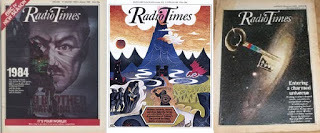
Or this:
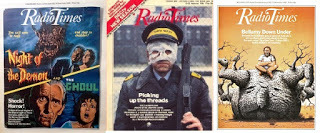
(You can, of course, click any of these for a better look.)
A word of explanation, for younger readers and other not-we. Until the early '90s, there was fierce regulation of TV and radio listings in the UK. Only the Radio Times provided a complete guide to the BBC; only the TV Times provided a complete guide to ITV and - from 1982 - Channel 4. Newspapers listed the schedules, but with minimum details. All decent middle-class households bought the Radio Timesand the TV Times in order to cover all channels, but that seemed acceptable because they only cost 35p.
There was, however, a difference between the publications. While Radio Times covers might be like this...
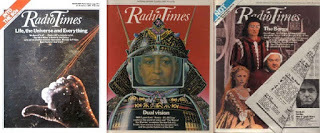
...TV Times covers were almost always like this.
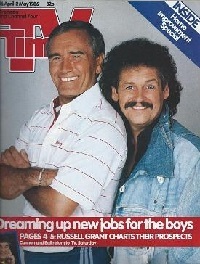
Yeah. If you can't read it, there's a banner in front of Cannon & Ball advertising Russell Grant's astrology column. The rightmost Radio Times, meanwhile, is the RT parodying itself at the behest of Not the Nine O'Clock News.
A general principle here, which should appeal to anyone interested in the traditions of old-school BBC telly: “democracy isn't giving people what they want, it's doing what you think is right and then letting people judge you for it”. For all its faults and misfires, the BBC has traditionally proved itself against commercial channels in this way, and the comparison between the Radio and TVtimeses tells you everything. The mandate of the BBC was experiment, inquiry, and a cultural idealism that was best exemplified by David Attenborough (in his old role as controller of BBC2 rather than “just” a wildlife presenter-explorer) but is now routinely described as “elitist” by bottom-feeders in the employ of Rupert Murdoch. It worked for the BBC and it worked for the Radio Times. When deregulation came in 1991, and all channels appeared in all magazines, it still outsold the TV Times. A typical RT letter of that era would grumble about the interpretation of Iago in BBC2's version of Othello. A typical TVT letter would plead with Bet Lynch about the door policy of the Rovers Return as if she were a real person.
My favourite Radio Timescover of t'olden days, however, is this:
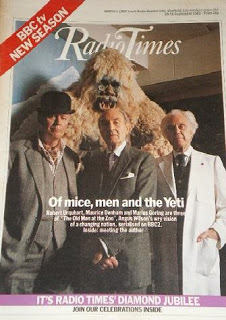
Three old men and a stuffed Yeti, advertising a comedy-drama about a zoo facing a nuclear war. (It was the '80s. The Old Men at the Zoowas scripted by Troy Kennedy Martin, who went on to write Edge of Darkness, a less jovial nuclear thriller which was nonetheless originally about a policeman turning into a tree.)
And here we have the nub of it. Look at all the covers I've shown you so far. Every one of them publicises either an unfamiliar series or a one-off special. A documentary about cosmology, when such a thing was still a novelty? Intriguing. Serious investigation into the consequences of digital technology, as illustrated by a TV Cyber-Samurai? Cutting edge. Three old men and a stuffed Yeti...? Cover material! At the time, no commercial channel would have risked making these programmes; no publication other than the Radio Times would have risked putting them on the cover; no other magazine would have made me-as-a-child feel so involved in the wider world.
This is a point that Doctor Whofandom tends to miss. No Tom Baker story made the cover of the RT(although some would argue that the interiors made up for this, given how we tend to think of Frank Bellamy's Skarasen as theSkarasen). I've heard fan-folk suggest that this was some form of snobbery, but the truth appears less cynical: Doctor Who never got cover status in the late '70s because it didn't need help, because it was accepted as part of the mainstream, because its return was inevitable. It made sense to keep reminding people of the series' existence in the '60s, when viewing figures were unstable and nobody was even sure if it could survive the absence of Hartnell. It made sense to hype the Barry Letts version throughout Pertwee's run, when the series was redefining itself as something colourful, dynamic, and occasionally even chic. Sort of. After 1974, though, the programme found its safe ground. Doctor Whocould look after itself. It didn't get another cover until 1983, partly because the twentieth anniversary deserved a celebration, partly because 1983 was when it found itself in trouble again.
That was then. But it was an age when both the BBC and its inky right-hand-man were still reasonably idealistic.
Here are some covers from last year:
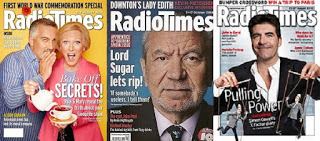
And from the year before that:
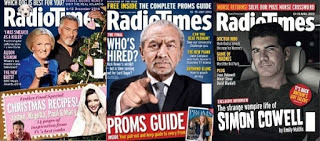
And before that:
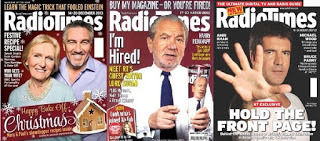
TV Times triumphant.
This would have been unthinkable until relatively recently in the BBC's history. I freely admit to liking Bake Off, but the key point is that it shouldn't needadvertising this way: it's a much-loved and highly-rated programme on BBC1, and twenty or thirty or forty years ago, the Radio Times would have accepted it as such while putting an obscure newproject on the cover. Likewise The Apprentice, which personally I'd never watch in a hundred lifetimes. The third example here isn't even worth mentioning by name.
The cover of the Radio Timesis now a statement of the familiar. “Well, Here'sSomething Interesting” is replaced by “LOOK! THAT SERIES YOU ALWAYS WATCH IS COMING BACK!”. This matches the hideous shift in the publication's whole nature, from an organ of curiosity to a banal Lifestyle Magazine. Its current TV editor, the abominable Alison Graham, is literally too thick to understand the plots of mainstream television dramas. Even as late as the '90s, all of this would have seemed ridiculous.
Still, it's different for us Doctor Whopeople, isn't it? One of the great joys of the series, when it was resurrected ten years ago, was that it made the covers of the Radio Times look like this:
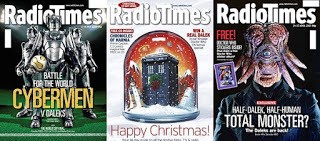
Yeah, screw you, Alan Sugar!
Ahhh, but wait, though.
The most significant of these three is, of course, the Human Dalek that accompanied “Daleks in Manhattan”. It's notable because it's the first Radio Timescover to give away the sodding cliffhanger, but the real point is that Russell T. Davies knew this when he OK's it: he explicitly said that he wasn't sure whether the cover or the cliffhanger was the bigger deal. With hindsight we like to think he made the wrong choice, but let's look at it with extra-hindisght. He thought about whether putting a half-human half-Dalek mutant on the cover would benefit the series, and made his decision based on that.
Bear this in mind when you look at these.
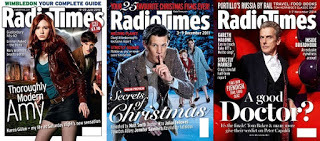
The most obvious point to make is that with the exception of the Dalek election issue (too good for them to resist), Doctor Whocovers since 2010 have dedicated themselves to publicising Moffat-scripted episodes. I'm not going to suggest that this is because he's an awful, awful man who's lobotomised the series by turning it into his own personality cult, because if you haven't already worked that out then you're very stupid. But I will point out that - again, for all his faults - Russell T. Davies didn't play it this way, at least not in the beginning. On Davies' watch, we have covers that suggest the story rather than the people who make it, breaking the modern Radio Timesnorm and returning us to a more dynamic era. This starts to fall apart at the same time as the series itself, circa 2008, when the Celebrity Age of Doctor Whoreally kicks in and David Tennant's presence becomes more important than any of his adventures; the point when the coups of hiring John Simm or Catherine Tate or Kylie Minogue become bigger news than the content.
But by the time we get to Moffat's reign, it's faces (and, in the case of Karen Gillan, absurdly gratuitous thighs) all the way. Mug-shots of the actors he cast, in the stories he wrote, with anything else relegated to background. Given the showrunner's general contempt for science fiction - remember, this is a man whose distrust of the nerdishness of SF is such that despite liking the work of Iain Banks, he refuses to read anything by Iain M. Banks on principle - we'd hardly expect curiosity to be at the core of the show, but nor would anyone in 2005 have expected the publicity material to be about celebrity profiles rather than (say) monsters or alien planets. Monsters and alien planets would be far more likely to draw in non-fans, yet that's not the purpose here. This is brand reinforcement. Even Doctor Who becomes a Lifestyle product instead of an adventure. The fetishisation of the Doctor, the notion of the series being about the star rather than the worlds he visits, is only one aspect of this.
You'll note that I didn't include the most telling example. It's this one:
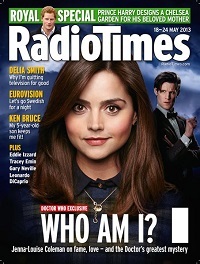
I'm putting my cards on the table now. I haven't watched Doctor Who since 2011, because it was just horrible and I don't like staring at things that make me feel bad. I've never criticised the content of the programme since then, because I'm simply not qualified: I can criticise the way it's marketed, but that's true of endless Hollywood blockbusters that I'll also never see. (My former flatmate, rather younger than myself and a Doctor Who fan for much of his early life, only bothered to watch about half of the last season and described it as “a waste of good Capaldi”. I'm inclined to trust him.) At around the same time that I finally gave up on the series, I stopped reading the Radio Times, for not dissimilar reasons.
So when the above issue came out in 2013, I walked past it several times in numerous supermarkets without having any idea that it was actually a Doctor Whocover. It could've been advertising Emmerdalefor all I knew. I only realised the truth because I had to move a television set for an ancient relative, and was in the same room as her copy of the RTfor long enough to notice the git with the bow-tie standing on the right.
A comparison with the past feels like a cheap shot, but that doesn't mean it isn't fair.
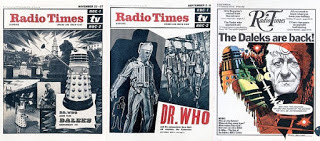
Does any of this really matter, though? It's just a listings magazine. Does it make any difference to what the BBC Proper actually produces...?
Hmm. Now, I don't know about you, but for me the BBC adaptation of Jonathan Strange and Mr Norrell was the best television of this year. It was only halfway through that I found out the scriptwriter works on Doctor Who these days, and good for him, it's nice to know Moffat may have a successor who isn't terrible. However, let's consider the unlikeliness of Strange & Norrell's production. A vast, epic, hugely-budgeted, joint-American BBC production, shown in prime-time on a Sunday night! A sprawling, literate nineteenth-century fantasy requiring the creation of an entire alternate world, like nothing attempted in the Corporation's recent history! So obviously, the cover of the Radio Times in the week of the first episode is going to publicise...
...er...

...okay.
Strange & Norrell wasn't reassuring enough, y'see. The RTapproved of it on its “picks” page, but putting elemental parallel-universe magicians on the cover when it's not a tested series and doesn't have known celebrities as the stars...? Nah. In the middle of Strange & Norrell's run, Channel 4 started showing Humans during the same timeslot, a programme best summarised as Hollyoakswith robots. Channel 4 won this war, with a massively inferior series, because it actually bothered to advertise Humans. Whereas on the night of the final Norrell, one Twitter user with a TARDIS in his ruddy avatar told me that he'd "never even heard of it until tonight". The RTis meant to be one of the BBC's key publicity devices, yet it can't even sell a massive-scale drama production to a ready-made audience if the content involves imaginationof any kind. The result is that any similar production becomes vastly less likely, especially with an appalling 10% budget cut on the way.
I think we all know that the BBC, however much we may slag it off for its transgressions, has historically been fantastically good at its job. My generation took this for granted, but it's now under threat. And though we (not unreasonably) see its key enemies as being right-wing fanatics – the government and the press, even though the Corporation's recent current affairs output has been ludicrously pro-Conservative – its greatest liability is its own fear of deviating from the modern commercial norm, despite the fact that deviating from the commercial norm is its entire purpose. The Radio Timesis more culpable in this than any other single part of the operation.
Which brings us here.
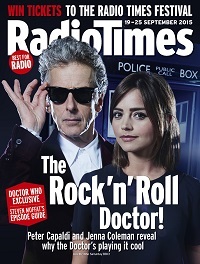
July 10, 2015
Minor Footnote
The greatest single problem with the fetishisation of the Doctor as an action hero - and this isn't just true of the post-Tennant version, it was also true when Tom Baker was running out of control circa 1978 - is the belief that the Doctor's main function is to "save people".
No, that's Superman you're thinking of. Saving people is a side-effect of what the Doctor does.
April 23, 2014
Erratum
ME, ON A PODCAST: "I think 'This Town Will Never Let Us Go' is the most 2004 book imaginable. It couldn't have been written in 2003, it couldn't have been written in 2005."
E-MAIL CORRESPONDENT: "It was written and released in 2003."
ME: "Oh."
March 7, 2014
Unlikely Countdown Screencap #3
January 14, 2014
"Many Damned Things"
...being the new blog. Not unlike like this one, but with wider interests and less obvious libel. (This week: Damned Dinosaurs.)
December 28, 2013
#AddAWordRuinADoctorWhoStory
November 22, 2013
One Last Time
...unless you're interested in the time in which it was made. Every story ever told, every work of culture ever cultured, has to be judged in the context of its era: Our Thing goes further. A narrative spread across decades, stealing from the rest of human creation by its very nature, magpie-collecting from all of history and from all the storytelling devices we've used to make sense of that history. Watch virtually any other television made in 1963, and you're looking at something that only makes sense if you're first-generation Homo '60s, something you can mock for its scenery-flat cowboys or its egregious use of the word "transistor". Watch the very earliest Doctor Who, and you're watching something about 1963 as much as something that happened to be made there. The ability of the TARDIS to step outside the here-and-now means that every episode is a commentary on its own place in time.
Now we've arrived at the great jubilee, every blogger and broadsheet is listing its Ten Best Stories, or Best Stories of Each Doctor, or All Stories Ranked According to Personal Prejudice. But the final verdict has to be this: Doctor Who has bound itself into every year in which it's been made. I couldn't care about "An Unearthly Child" without being curious about early '60s radiophonics and early '60s war-baby thinking. I couldn't care about "Carnival of Monsters" without taking an interest in '50s SF literature, and the way it affected the people who wrote for TV twenty years later. I couldn't care about "Weng-Chiang" without wondering how the Hammer-gothic tradition shaped British pop-culture in the years that followed. I cculdn't care about "Caves of Androzani" unless I cared about I, Claudius as well, though admittedly that's a bit of a weird one on my part.
Which is why the need to rank and review Doctor Who stories, usually according to spurious rules of sci-fi telly devised years after those stories were made, is a curse on all of us. Lists have always been our downfall. Consider Doctor Who as a mass of TV-making, ethic-defining principles hurtling forwards in time, smacking against the what-we-now-call-tropes of every age and making fabulous, unpredictable shrapnel. Endless pages of About Time - by myself and Tat Wood, and you can often see the bloodstains on the pages where we're ripped chunks out of each other - were wasted in arguing about whether we liked any given story. But the internet is already made of reviews, and besides, Doctor Who covers so much territory that none of us will ever agree with anybody else re: what it really "is". I can only say what I think it is...
...it's like nothing else on Earth. Nobody else in 1963 was making anything that looked like "The Daleks". Nobody else in 1982 was making anything that told the same kind of story as "Kinda". Nobody else in 2005 was making anything that resembled "Rose" at all.
So there it is. All Doctor Who is ridiculous, hackneyed, and saa-aad - let's say it, unwatchable - unless you're primed to understand its place in history. This is, and will be, just as true of the present series as it was of the past: future generations, should they be able to neuro-experience their complete set of iPsych engrams before complete global meltdown, won't be able to appreciate the Matt Smith era unless they also appreciate superhero movies, the cinema version of Harry Potter, XBox-age video gaming, or the early twenty-first-century version of slash-fic. I don't appreciate any of these things, which is why I find it unwatchable now, and also why I hate the modern world. Natch.
But am I right...? Yes, of course I am! Don't be silly. The ad for "The Day of the Doctor" looks as if it should have "not actual game footage" at the bottom of the screen. I'm also entirely wrong, according to people who were eleven-ish in the early '70s and think Doctor Who is all about alien invasion stories, or people who were born just after "Survival" and have no problem with that f***ing fez.
I have nothing else to say, but I don't want "fez" to be the last word.
November 21, 2013
One Day There Will Come a Point When Everyone Realises That I Actually Did Just Want Things to Be Nice
...and being so angry, I tweeted about it, may my bones rot. And then I realised, moments later, that this will be taken as some sort of grudge match. Moments after that, I started getting tweets asking me to justify my angst. "Ahh, it's not a documentary! Yeah, it gets some facts wrong, so what? Isn't this a great way of telling the story of the programme in the early years? Oh, you just don't like Mark Gatiss!"
It does, indeed, get facts wrong. Just like Mel Gibson movies get facts wrong. It gets facts wrong to a degree that would be actionable if those involved were still alive.
"Facts" like people's entire professional lives. Here are the two chief victims.
1. Verity Lambert was hard as nails. In a script full of stereotypes, she becomes an off-the-shelf silhouette from Mad Men, a token woman whose purpose is to oppose The Male Hierarchy without having any life of her own. Ooh, look! The Old Boys at the BBC aren't listening to her, so she has to clear her throat and shout just to find her voice...! Bullcrap. The reason Newman described her as "piss and vinegar" (a term repeated throughout this cock-pie, since Gatiss can't be bothered doing more than surface research) is that she was terrifying before she got the Who gig. We recall that when an actor died live on TV in 1958, it was Lambert who fixed it without breaking a sweat. We recall that by the time "An Adventure..." portrays her as a young woman gulping at the thought of having to face a room full of BBC humbuggers, she'd already been threatening productions into shape on both sides of the Atlantic and was openly complaining about the fact that those bastards wouldn't let her produce or direct. "An Adventure..." has her shuffle into an office like a new girl who's had a tail welded between her legs as part of an initiation ceremony. Because, gee, that's what women did in the early '60s! Right?
In short: Verity Lambert, the greatest left-wing feminist firebrand in the history of British television. Reduced by this script to a simpering girl-who-learns-self-confidence (aged 28...!) and only becomes a Proper Character when she shouts down Sydney Newman in his office after he pushes her that one step too far. I'm not suggesting Mark Gatiss is a misogynist, I'm just saying that maybe he doesn't appreciate the way female characters are... no, f*** it, I am saying that. He can't write a workable female character unless it's based on his own mum. By the time her fiction-self starts whining on about not being taken seriously, the real Verity would already have been flicking fag-ash in Sydney's face.
2. Sydney Newman was not, as "An Adventure..." suggests, a 1930s film producer exactly like Cecil B. DeMille. You probably knew that anyway, but you let it slide because it was funny. What isn't funny is the thought that although Newman could certainly hold his own against TV execs on all sides, here a dead man who can't defend himself is made to look exactly like one of the people he enjoyed fighting. He had a North American accent; ergo, he has to behave like the boss of a major TV network in an '80s movie, or possibly Scarface. But Newman was the most inventive producer of his era, and although it's true that his background in commercial telly made him wise to the needs of Those Who Pay For This, he really liked the oddness that a space-time series could bring. "An Adventure..." begins with Newman suggesting an SF programme because The Kids will go for it, whereas in truth, he honestly wanted to see what would happen. Note the way his creation of The Avengers is mentioned as a side-note, delivered as if he's the boss and his minions did all the hard work. Because obviously, this American-talking cigar-chomper couldn't possibly have done anything really creative.
Even though he did. Repeatedly. Doctor Who was incomplete when it came out of his mouth / subconscious, but he was undeniably its source. For that, he's now treated like a monumental git. He thought up Adam Adamant Lives not by wondering what would sell, but by looking out of his window at roadworks and thinking "hang on, what if...?". And we should bear in mind that Newman chiefly objected to bug-eyed-monsters not because of personal anti-Martian issues, but because the Frick-Braybon report at the BBC said they definitely didn't work on television. He loved science fiction, and openly said so.
Among the people Sydney Newman promoted in their TV careers were Harold Pinter, Dennis Potter, and Ken Loach. Again, he apparently did this despite being a mogul from three decades previously who just couldn't resist sticking that cheroot in his mouth while going "waak, waak, waak" like the Penguin.
The clincher comes in the everyone-knows-this-never-happened scene of "An Adventure..." in which Newman congratulates Lambert on her Daleks getting ten-million viewers, and retracts his previous views re: aliens. "WOO!" yells Lambert, running down the corridor. But the BBC didn't treat the ratings as their guide in the early '60s: when independent television began stealing the viewers in 1955, many at the BBC even breathed a sigh of relief, since it meant they didn't have to be populist any more. Big Dalek ratings would indeed have been welcomed by Our Verity - who doesn't like being liked? - but presenting this as a scene in which she stands before Newman the Network Chief, justifying the series in terms of viewing figures, is simply drivel. Yes, yes, we can accept him as the producer-figure long after he was actually producing. We can swallow it as part of the story. But making a good (dead) man look like a cynical arch-scheduler is just... rude.
In short: The person who first thought of Doctor Who, then summoned up the best people to make it happen, is a corporate monster who lurks behind a desk and dwells on the ratings despite having no real reason to do so. His dialogue is so awful that even non-professor Brian Cox can't make him look good. It's horrible, partly because it's made of lies, but mostly because the real Sydney was always trying to do something interesting. And this version only exists because Cigar-Faced TV Producer Stereotype is easy to write, whereas actual Sydney Newman isn't. Nonetheless, this version is in the TV pseudo-drama, and will be repeated at every anniversary from now on as if it were true.
Mark Gatiss. You are the Mel Gibson of fandom. Please, please stop trying to write. You were very good in The League of Gentlemen, but being a talented comic actor doesn't qualify you as a writer. Your Doctor Who scripts are mediocre at best, and even then, you're relying on the designers to bail you out. Your Poirot adaptations are also terrible. Just... stop. All right? Comic acting. You're good at that. Keep it up.
There. Tomorrow, my "nice" goodbye. The one I was planning on writing.
October 10, 2013
THERE IS NO POINT TRYING TO BE SATIRICAL AND ALOOF IN THIS TIME OF ABSOLUTE AND UNBRIDLED NATIONAL CELEBRATION
1. If anyone sees Tat Wood, could you please give him the hug that he'll claim he doesn't want but that he'd obviously really cherish right now?
2. Since Lance Parkin's clearly so ahead of the game (and notoriously obsessed with / bad at 21st-century faux-history), could someone ask him what the date on Swann's newspaper in "Enemy of the World" is? 'Cos based on dodgy photos, Timelink dated the story to 2013, which would be f***ing wonderful if true.
Lawrence Miles's Blog
- Lawrence Miles's profile
- 58 followers


